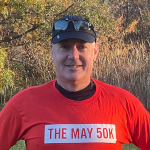- More than 7,000 participants attended the 38th Congress of the European Committee for Treatment and Research in MS (ECTRIMS) in person, as well as 2,000 online.
- Over 1,700 research projects were presented, providing updates at the first in-person ECTRIMS meeting since 2019.
- Over 100 countries were represented during the congress, and countless new networks and collaborations were established, all in the name of furthering and building on current MS knowledge.
ECTRIMS recently held its annual meeting in Amsterdam, The Netherlands, from 26-28 October 2022. Our team at MS Australia attended the conference, which is seen as the pinnacle of scientific and medical research into MS.
Selecting features is never easy with many sessions running concurrently, but this article provides an overview of some of the key highlights.
Paediatric MS
The opening address from Professor Brenda Banwell (USA) outlined the great strides made in paediatric MS over the last 10 years. In particular, the addition of disease modifying therapies (DMTs) to treat MS early in children, networks of specialist MS paediatricians, guidelines to treat paediatric MS and the need for careful management of cognition issues as the brain develops during childhood.
Professor Banwell reported that the biggest change she has seen in her 20 years as a paediatric MS neurologist was how the children viewed their disease.
Previously, when she asked them how MS impacted on their life, it was often a sad reply about needles. Now with DMTs that are much less invasive, it is having less of a day-to-day effect on their lives, with overall quality of life being much greater.
However, Professor Banwell also cautioned that recent research has uncovered that some mothers of children with MS also suffer from depression and that holistic care must be extended to the entire family when working with children living with MS.
Disease modifying therapies
Many research reports involved deeper and extended studies on the DMTs used to treat MS, many of which are available for relapsing MS in Australia.
In providing long-term data on these DMTs, we can be assured that these remain safe and effective in clinical practice when current guidelines and safety monitoring are followed.
In addition, further information on special indications for treatments was provided, suggesting that some of the newer DMTs may be safe to use while breastfeeding. However, further studies are to follow to confirm this. New research has suggested that fertility treatments do not raise the risk of relapse in women with MS.
MSBase, an Australian-based international registry, featured heavily in the DMT studies presented, with many large-scale studies possible because of the contributions of many Australians living with MS and the efforts of their neurologists and MS nurses in reporting data to be included in the research.
Radiologically isolated syndrome (RIS) is apparent when a magnetic resonance imaging (MRI) scan reveals lesions that may be suggestive of MS, but there has not been an attack. An example is an “accidental” finding of MS-like lesions in someone having an MRI for the assessment of headache or trauma. A new study has explored if treating people demonstrating RIS with a DMT might delay the onset of the first clinical attack of MS. Although the study numbers were small, the answer was a significant yes, suggesting that this is an area for deeper research with higher numbers of participants to determine guidelines for future care.
Autologous haematopoietic stem cell transplant
Many current clinical trials into autologous haematopoietic stem cell transplant (AHSCT) are expected to be finalised within the next 1-3 years, providing important answers to the questions remaining about the right time and right person to benefit most from AHSCT.
Although the AHSCT mortality rate has decreased, we are yet to understand its long-term safety and effectiveness, and fertility remains an issue for people who have undergone AHSCT.
Several clinical trials in progress are also aiming to determine the best chemotherapy to use for AHSCT, and other clinical trials are adding cognition assessments to their evaluations to determine its other potential effects.
However, it is clear that AHSCT is likely to benefit those with active inflammatory disease rather than those with progressive non-active disease.
Other demyelinating diseases
Several sessions on neuromyelitis optical spectrum disorder (NMOSD) and myelin oligodendrocyte glycoprotein antibody disorder (MOGAD) brought together clinical and research specialists to better understand the progress in both areas.
In NMOSD, we now know that disability is tied to individual attacks, rather than to general disease progression, as we see in MS.
There is also evidence of a “cluster period” where there is a higher risk of another attack within the first 12 months, the clinical impact of this being to carefully manage weaning down of treatments rather than just stopping suddenly.
Clinical trials of AHSCT are also currently underway for NMOSD.
MS Nurses
A special session for nurses involved discussions on MS Nurse education through MS Nurse Pro, an educational platform to strengthen nursing training and research skills.
The second session involved two speakers from Australia who highlighted the unique role of the MS Nurse in MS care, providing a lynchpin for the clinical care team and an important partnership with people living with MS by being an advocate for the lived experience.
The MS Nurse Care in Australia report demonstrated strong evidence that MS Nurse care improves outcomes for people living with MS. At present, one in three people with MS in Australia do not have access to an MS Nurse, and this situation needs to be resolved immediately to improve outcomes.
By investing $5 million into the MS Nurse workforce to ensure all people living with MS have access, savings of over $64 million annually can be made. Internationally, there was much interest in this report, the first of its kind in the world.
Beyond the conference
After three days of networking, collaborations and presentations, ECTRIMS 2022 will live on for months and years, as important research connections will lead to new understandings and knowledge.
As this happens, MS Australia will report back to the MS community about new findings and deeper insights as they develop. We can be assured that Australian researchers, many funded now or previously by MS Australia, will be contributing significantly to the differences made and the new knowledge gained.






